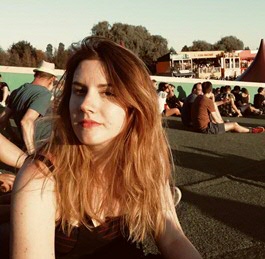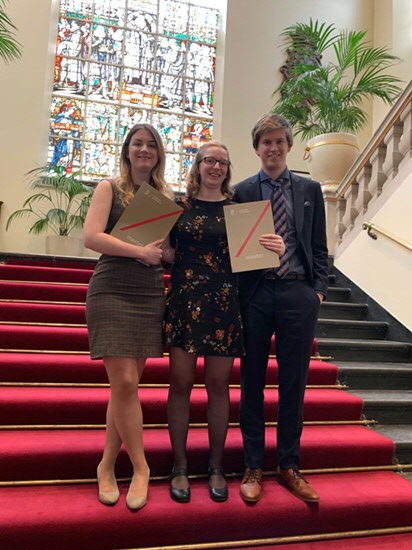Alumna Júlia-Janka Gáspárik

Júlia-Janka Gáspárik is our next alumni in our series about alumni stories abroad. Although she is not currently working abroad, her experience, education, and language skills are evidence of her international footprints. This will include i.a. Cluj-Napoca (Romania), Prague (Czech Republic), Brussels (Belgium) and Groningen (the Netherlands).
Tell us about yourself and your work. Where are you originally from?
That is a difficult question actually: I am from the Hungarian minority in Transylvania (Romania). I consider myself Hungarian but I have never lived in Hungary. I started my first Higher Education in Cluj-Napoca in English, at the Babes-Bolyai University, European Studies Faculty.
I was a Blue Book trainee in the European Commission, DG Education and Culture, Unit Higher Education while finishing my last semester of Euroculture in Groningen. During the last month of the internship, I started applying to different organizations. The European Association for International Education called me back and I attended an interview in Amsterdam for a full position as a knowledge development assistant. There was three weeks between my internship and the start of the job, but I was hired before I was done in Brussels. The connection with my job is that I studied at four different universities in four countries so I had a lot of experience with internationalisation already when they hired me in DG EAC as a trainee. Having five months of policy and programme experience in the EC led me to apply for the position at the EAIE, where I also work on higher education and internationalisation.
What was your career path being an international alumni?
As a European Studies student in Cluj Napoca I was lucky to be able/ encouraged by the faculty to complete shorter and longer exchanges during my Bachelor. After finishing my Erasmus semester in Prague in 2016, I was in love with studying and living abroad, so I was sure I would apply somewhere different for my master studies. I wanted to experience something other than Central Europe this time, so The Netherlands was an obvious option considering the tuition fees and cost of living.
I was interested in European Studies and IR programmes, but the criteria restrained me a bit: even though my overall English exam (IELTS, C1) results were high, my writing was under 7.5, thus I could not apply to the research tracks or some more specific programmes. In the end, I was admitted to IRIO and accepted the offer without hesitation.
Months later, writing my IRIO thesis, I noticed the Euroculture poster on the corridor of the Harmoniegebouw. I applied, because I felt my IR studies were excessively theoretical and I need a more practical approach to find a job later in life, as I knew I am not PhD material. I talked with some alumni and student ambassadors and they convinced me that this is the right master if I am looking for practical experience.

Students often find themselves accountable for their choice of study and the benefit of the study. Have you also experienced this and what were the reactions to your choice of study?
My study choice was pretty straightforward: pursuing a BA in IR and then going for a Master in IR. It was me who realised this is probably not my path during my masters. My second master in Groningen, Euroculture was my decision too, but my parents supported me, especially when I explained that this would mean internships and practical experience. That is exactly what I was looking for: specific, on-demand skills, international experience and practice.
How did you experience your student days? Were you an active student?
Student days is Groningen were one of the best things in my life. Attending ESN events on the early days helped me get to know many people, and then attending the USVA improv courses was a great idea too. Most of my friends were from these circles less than from my master. Within the faculty, I attended events quite often but I never joined a study association. During my masters, the weight of the workload and the limited time in Groningen made being active slightly challenging.
How does your career link up with your studies and which aspects do you see recurring?
It is hard to distinguish which parts of my career came directly from my studies and which ones from the study experience in a broader sense. I consider living abroad for my studies, creating a network in a foreign city and getting used to a completely different study culture as some of the most important links with my career. These were part of my studies but they were not in the curriculum.
What I see recurring is the analytical and methodological skills I acquired during Euroculture. Learning to how to approach a problem, a text, or even a legal situation helped me many times later in life. At the same time, I also learnt how to communicate with different people and how to solve situations.
On the academic knowledge level, I mostly use EU law and EU institutions/ decision-making. I definitely use many of the skills I acquired. At my current work, I most often make use of academic writing, communication and European institutions skills.
Have there been subjects, experiences or persons within your study that have stayed with you or inspired you? Share some anecdotes with us!
I will always remember the topics from the Cultural Construction of Europe. I really miss having deep conversations with a great group of people about these kinds of European topics. I will also always remember the cool atmosphere in the Harmonie cantine, always full of people with the best outfits in the entire city. I loved to go there during the breaks and meet people randomly while queuing for coffee.
| Last modified: | 24 January 2023 1.27 p.m. |
